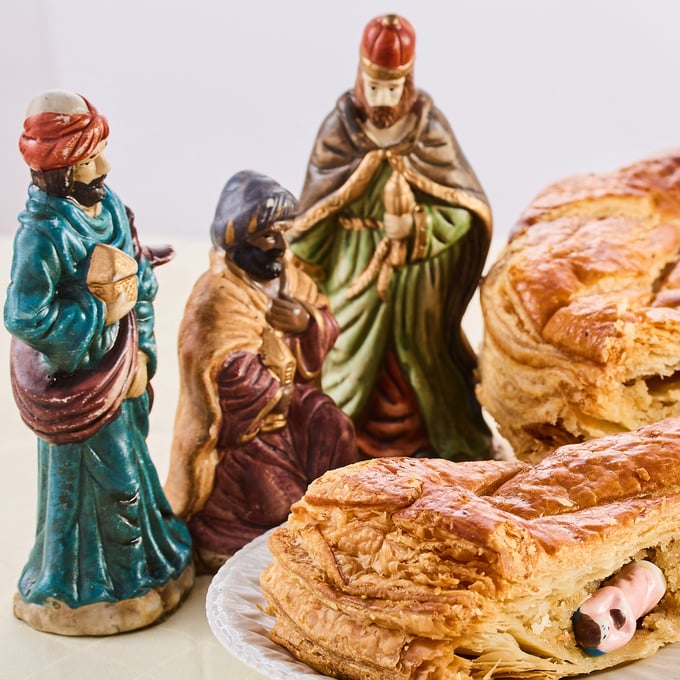“Family-friendly Mardi Gras” may seem like a contradiction in terms, especially to people who live outside New Orleans and Louisiana. For many years, the media has focused on the event’s most lascivious aspects, particularly raucous French Quarter parties packed with people from all over the world. Nevertheless, many fun-loving Catholic families have learned how to keep this time-honored tradition safely and sanely alive.
Mardi Gras and the Carnival season have a long, mixed history in the Catholic Church. January 6, the Feast of the Epiphany and Christmas’ original gift-giving day, traditionally opened a series of parties, masked balls, and parades throughout Europe, which ended on “Fat Tuesday” (the English translation of the term). To follow the eight to twelve weeks of Carnival’s “profane” feasting, Pope Gregory the Great (590-604) designated Ash Wednesday, the day after Mardi Gras, as the beginning of Lent’s 40-day penitential fasting. Preparing his flock for the Church’s most Solemn Feast, Easter, Pope Gregory sent out missionaries to “sanctify any excesses in popular Carnival customs” (Wikipedia).
Devout Catholics used Mardi Gras to finish costly dairy products and sweets they had enjoyed during the Carnival season. Lack of refrigeration turned the closing holiday meal into an enjoyable blessing for faithful and frugal families.

In Great Britain and the British colonies, Pancake Day, also known as “Shrove Tuesday,” was celebrated instead of Mardi Gras. Today Catholic families can turn a simple pancake breakfast or supper into a cheerful celebration by adding a few colorful beads for decoration. Remembering homeless people during the blessing, a delicious meal in an attractive setting can help families prepare for Lenten gratitude and self-denial.
More traditional French-style Epiphany cakes, or galette des rois, provide even greater opportunities for family catechesis. Decorating a store-bought coffee cake with paper crowns and figures of the Wise Men can make a wonderful lead-in to reflect on why Jesus was born on Christmas Day. Christ’s ultimate mission was to die on Good Friday for the sins of all mankind, regardless of race, creed, or color. His Resurrection on Easter Sunday restored our dignity as heirs of His heavenly kingdom.

For families who prefer healthier alternatives, crowns or clown faces made from hamburger, cheese, fruits, vegetables, or a combination, accompanied by beads or Christmas figures, make fanciful substitutes. Enjoying wholesome foods on Mardi Gras provides opportunities to recognize our solidarity with those who can’t afford enough to eat. Families can plan to give Lenten alms to food banks, soup kitchens, or local charities.
In addition to festive foods, a party featuring a king and queen can round off the celebration. At colonial Louisiana house parties, a king or queen was selected by whoever found a lucky bean hidden in the King’s Cake. The royalty then selected his or her escort and paraded them around the dining table. Very young children can safely participate in modern-day parties by putting a bean, tiny plastic baby, wrapped candy, or trinket discretely in a gift bag.
One year, my family hosted a children’s Mardi Gras ball and neighborhood mini-parade, based on fairy tale princes and princesses, and action heroes and heroines. We made crowns from storybook covers for each invited child. After decorating our Radio Flyer wagon with beads and crepe paper, our “krewe” marched around the block. It was my favorite Mardi Gras. All the guests had fun, and everyone’s spirits were lifted!

As an evening wind-down, Henry van Dyke’s book, The Other Wise Man, or its popular film adaptation, The Fourth Wise Man, provides a thought-provoking family meditation. Although not written expressly for Lent, the plot centers on the Wise Man who was unable to pay homage to the Christ Child at Epiphany. At the end of his decades-long quest, he finds Jesus dying on Calvary. The Wise Man discovers in his dying moments that he had met and helped Jesus “in distressing disguise” many times through the works of mercy he had done for others.
Passing Down the Faith
In an age when parents and grandparents are concerned about passing on their faith, I encourage you to consider Mardi Gras, Tuesday, February 13 (the day before Valentine’s Day) as part of your family’s Lenten preparation. Mardi Gras is my annual reminder that joyful Catholics should be light shining in today’s darkness!
So, laissez les bons temps rouler (let the good times roll), y’all! And have a Happy Mardi Gras and a blessed Lent!
Copyright 2024 Connie Anderson.
Images: All Images Licensed from Adobe Stock by CF Anderson, QH Productions, all rights reserved.